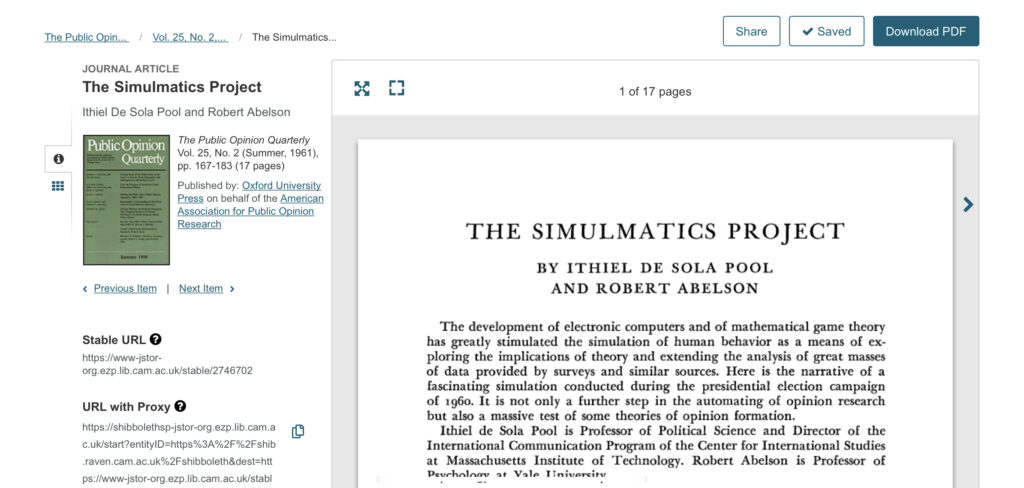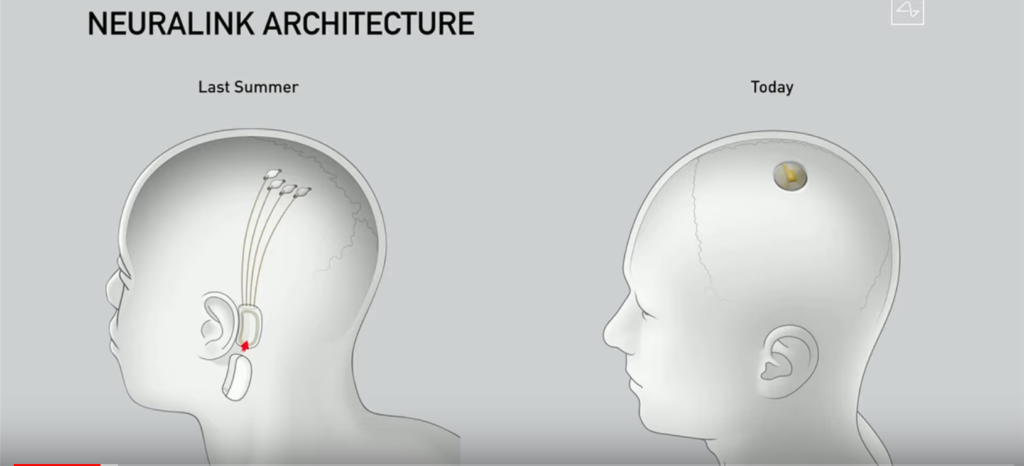Quote of the Day
“Don’t wrestle with pigs. You both get dirty and the pig likes it.”
It’s the mistake liberals make when dealing with creeps like Trump and Farage.
Musical alternative to the morning’s radio news
Nicolas Altstaedt plays the Bach Cello suites in the Philharmonie in Berlin
Link
This is long (an hour and three-quarters in total) but beautiful. It reminds me of Casals’s wonderful version recorded (I think) in a small deserted church in Spain many years ago.
Thanks to Seb Schmoller for the link.
The Simulmatics project

One of the great benefits of working in a university is that one has access to lots of stuff that’s normally behind journal paywalls. So when I saw that the historian Jill Lepore has a forthcoming book about an astonishing data-science operation that was up and running for the 1960 Presidential election, I went looking for academic papers by the people who ran the project. And lo and behold, here’s one by two of the key figures.
LATER Charles Arthur (whom God preserve) told me about a New Yorker (non-paywalled) piece by Jill Lepore in which she sketches out the story on which her book is based. It begins thus:
The Simulmatics Corporation opened for business on February 18, 1959, in an office rented by Edward L. Greenfield, the company’s thirty-one-year-old president, on an upper floor of a building at the corner of Madison Avenue and Fifty-second Street, five blocks south of I.B.M.’s glittering World Headquarters. Greenfield, an adman, political consultant, and all-around huckster, pulled people in like a “Looney Tunes” magnet. “Ed Greenfield,” he’d say, flashing a Dean Martin grin, slapping a back, offering a vodka-and-tonic, palming a business card. His new company’s offices were threadbare; his ambition could hardly have been grander. “Simulmatics,” a mashup of “simulation” and “automatic,” had much the same mystique as another nineteen-fifties neologism: “artificial intelligence.” Decades before Facebook and Google and Cambridge Analytica and every app on your phone, Simulmatics’ founders thought of it all: they had the idea that, if they could collect enough data about enough people and write enough good code, everything, one day, might be predicted—every human mind simulated and then directed by targeted messages as unerring as missiles. For its first mission, Simulmatics aimed to win the White House back for the Democratic Party.
In 1960, John F. Kennedy defeated Richard M. Nixon in a campaign that carries an air of destiny, mainly because of an iconic account by the reporter Theodore H. White. In “The Making of the President 1960,” White created the myth of Kennedy as an inevitable President—King Arthur, pulling Excalibur from the stone. But Kennedy’s bid for the nomination was a long shot, his victory in the general election was one of the closest in American history, and his campaign deployed an election simulator. However commonplace now, this was new then, and fiercely controversial. White, while never naming Simulmatics, took the trouble to disavow its influence on the very first page of his book. “It is the nature of politics that men must always act on the basis of uncertain fact,” he wrote. “Were it otherwise, then . . . politics would be an exact science in which our purposes and destiny could be left to great impersonal computers.” White was close to the Kennedy campaign, and the Kennedy campaign had decided to deny, publicly, that it had used Simulmatics…
Interesting piece of history that. The only book I read about Kennedy’s victory was Theodore White’s. So I’ve been labouring under a misapprehension for six decades!
WashPo’s ‘Date Lab’
It’s strange what newspapers get up to sometimes. The Washington Post, for example, has something called a Date Lab.
Here’s how it works: We search our database of thousands of Washington, D.C.-area singles until we find a pair with romance potential. Then we send them out on a blind date on our dime and report the results in the pages of the Washington Post Magazine and online.
Our requirements: To participate you must be over the age of 21, single and living in the greater D.C. area. You must agree to have your name, age and picture published and to participate in a telephone interview.
Apply now!
Here’s an excerpt from one of the ‘experiments’:
Meeting through a computer screen did not curb their physical chemistry. Sam immediately noticed Elli’s olive complexion. He added: “She’s beautiful.” Elli, who Sam described as “extroverted,” was not shy about stating her height preferences. “I was like, don’t worry, I’m 5-foot-11,” he said. “And no one would lie about being 5-foot-11, so you can believe me.”
Sam says his ideal partner would share 80 percent of his political views (100 percent “would be boring,” he says), and over the nearly three-hour conversation, they discovered where their 20 percent gap in politics lay: former South Bend, Ind., mayor Pete Buttigieg. When Elli asked him who his preferred candidate was during the 2020 Democratic primaries, she said, “Please don’t say Pete.” (He said Pete.) Sam, on the other hand, says that Elli thought Buttigieg “was a Republican.” Ultimately, it was a difference that both of them could stomach.
There were no awkward lulls in conversation, and Sam did not consult his tab of questions even once…
Dark matter, second waves and epidemiological modelling
Since we can’t know the future, we have to make educated guesses about it. Statistical modelling is one way of doing that. This interesting (but not yet peer-reviewed) research paper uses a modelling approach to try to assess whether fears of a catastrophic Autumnal second wave of Covid-19 are too pessimistic.
Its conclusion is: they are. Or, as the researchers put it:
A dynamic causal model that incorporates heterogeneity of exposure, susceptibility and transmission suggests that the next wave of the SARS-CoV-2 pandemic will be much smaller than conventional models predict, with less economic and health disruption. This heterogeneity means that seroprevalence underestimates effective herd immunity and, crucially, the potential of public health programmes.
I hope they’re right.
Om Malik on emerging from lockdown
Interesting postfrom a thoughtful tech commentator and photographer.
As I become more open to the world, I notice that the words others use to describe it have become more calculated. Every word online, it seems, is uttered for the benefit of the platforms. Through the feed, which is how we experience the “now,” words are designed to provoke outrage. Images are almost perfect, each one laser-printed to perfect saturation, built to get likes and followers. Like a polluted stream, it flows past us.
Faster and faster it goes, when slower is what I want everything to be — especially my photography. I have lost all interest in perfection. The representation of reality is meaningless. From politics to stock markets to fashion, we find ourselves trapped in a reality that is nothing more than synthetically generated memes in obeisance to the hyper-capitalism.
For me, the camera has become a way to try and escape this world defined by unreal reality. When I find something that I see in synchronicity with my inner self, I want to use it to paint that moment. I want to get lost in what I can only imagine. My journey is taking me deeper and deeper into these imagined landscapes.
This is a constant quest. As I looked out in the Pacific Ocean beyond Bolinas, the feeding frenzy unfolding in front of my eyes, I imagined it as a pastoral activity in the distance.
The ocean had a green-blue color, not the ominous dark blue that one encounters during the winter. The sky was gray, but somewhere beyond, you could feel the sun slowly slithering into the ocean.
His photographs are always distinctive, though never vivid.
It’s not just Americans who are paying the price of Trump’s thuggery
Great essay by Andrew Sullivan — now back on his own blog. This is how it begins…
The Uighur women in exile in Istanbul are the fortunate ones. They managed to escape the control of the Chinese Communist regime, thanks to relatives who found ways to get them out of the country. But one woman refugee also has a confession: “She speaks of participating in at least 500 to 600 operations on Uighur women including forced contraception, forced abortion, forced sterilisation and forced removal of wombs. She told me that on at least one occasion a baby was still moving when it was discarded into the rubbish.” She believed, she says, that this was just part of the Chinese government’s overall birth control policy. Now she knows that was a lie. While birthrates have fallen by 4 percent over the whole country, in Uighur areas, they have declined by 60 percent. The only word for this is genocide — something we have now known for some time.
Meanwhile, the Russian president, Vladimir Putin, has denied that he had anything to do with the sudden sickness of Alexander Navalny, the most prominent Russian opposition leader. A Russian hospital where Navalny was initially treated claimed there was no evidence of poisoning. But as soon as he was transferred to Berlin for medical attention, incontrovertible evidence emerged that Navalny had been poisoned by the now-familiar nerve agent, Novichok, a substance manufactured by the Russian government. It is the same poison used against a former Russian spy in exile in Salisbury, England, a little over two years ago.
China’s dictator, president-for-life Xi Jinping, has made some efforts to hide his new complex of concentration camps, but he does not appear to be worried. Vladimir Putin, despite the pro forma denials, is also not particularly concerned that he be discovered as a state assassin. In fact, the blatant use of a nerve agent long tied to the Kremlin is a sign that he wants these attempted murders to be attributed to him.
And both dictators know very well that in president Trump, they have an American leader who is actually impressed — rather than repelled — by this kind of state thuggery…
Worth reading in full.
This blog is also available as a daily email. If you think this might suit you better, why not subscribe? One email a day, delivered to your inbox at 7am UK time. It’s free, and there’s a one-click unsubscribe if your decide that your inbox is full enough already!










